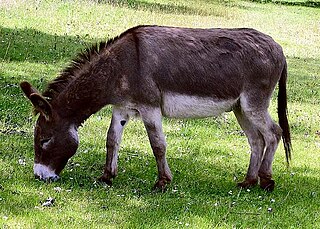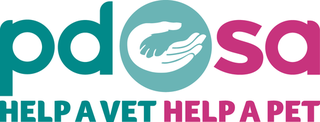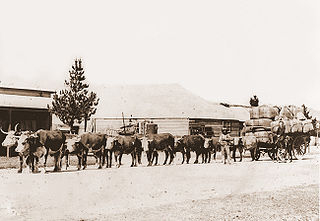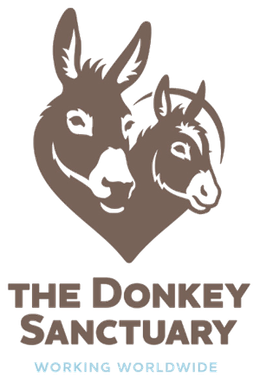
The mule is a domestic equine hybrid between a donkey and a horse. It is the offspring of a male donkey and a female horse. The horse and the donkey are different species, with different numbers of chromosomes; of the two possible first-generation hybrids between them, the mule is easier to obtain and more common than the hinny, which is the offspring of a female donkey and a male horse.

The donkey is a domesticated equine. It derives from the African wild ass, Equus africanus, and may be classified either as a subspecies thereof, Equus africanus asinus, or as a separate species, Equus asinus. It was domesticated in Africa some 5000–7000 years ago, and has been used mainly as a working animal since that time.

The hand is a non-SI unit of measurement of length standardized to 4 in (101.6 mm). It is used to measure the height of horses in many English-speaking countries, including Australia, Canada, the Republic of Ireland, the United Kingdom, and the United States. It was originally based on the breadth of a human hand. The adoption of the international inch in 1959 allowed for a standardized imperial form and a metric conversion. It may be abbreviated to "h" or "hh". Although measurements between whole hands are usually expressed in what appears to be decimal format, the subdivision of the hand is not decimal but is in base 4, so subdivisions after the radix point are in quarters of a hand, which are inches. Thus, 62 inches is fifteen and a half hands, or 15.2 hh.

Blue Cross is a registered animal welfare charity in the United Kingdom, founded in 1897. The charity provides veterinary care, offers expert behavioural help, and finds homes for pets in need. Their pet bereavement service supports those who are struggling to cope with the loss of a much-loved pet.

The Royal Veterinary College is a veterinary school located in London and a member institution of the federal University of London. The RVC was founded in 1791 and joined the University of London in 1949. It is the oldest and largest Veterinary school in the United Kingdom, and one of only 11 in the country where students can study to become a vet.

A pack animal, also known as a sumpter animal or beast of burden, is an individual or type of working animal used by humans as means of transporting materials by attaching them so their weight bears on the animal's back, in contrast to draft animals which pull loads but do not carry them.

The People's Dispensary for Sick Animals (PDSA) is a veterinary charity in the United Kingdom. It was founded in 1917 by Maria Dickin to provide care for sick and injured animals of the poor. It is the UK's leading veterinary charity, carrying out more than one million free veterinary consultations a year, and was until 2009 the largest private employer of fully qualified veterinary surgeons and veterinary nurses in the UK; only those living within the PDSA's catchment areas can use their services.

A working animal is an animal, usually domesticated, that is kept by humans and trained to perform tasks instead of being slaughtered to harvest animal products. Some are used for their physical strength or for transportation, while others are service animals trained to execute certain specialized tasks. They may also be used for milking or herding. Some, at the end of their working lives, may also be used for meat or leather.

The Society for the Protection of Animals Abroad (SPANA) is an international charity based in the United Kingdom, that works to provide veterinary care to working animals, including donkeys, horses, elephants and camels.

World Animal Protection, formerly The World Society for the Protection of Animals (WSPA) is an international non-profit animal welfare organization that has been in operation since 1981. The charity's mission is to create a better world for animals by protecting them.

The Donkey Sanctuary is a British charitable organisation devoted to the welfare of donkeys. The charity, which is based near Sidmouth in Devon, England, was founded in 1969. It is one of the largest equine charities in the world with an annual income and expenditure of £37 million.

The Horse Trust is an equine charity in the United Kingdom, based at Speen near Princes Risborough in Buckinghamshire. It was founded in 1886 and is the oldest equine charity in the world. It was set up to help the working horses in London. Upon the decline of the working horse in the 1960s it widened its remit to include education and research, becoming the largest provider of equine welfare grants in the United Kingdom.
Safe Haven for Donkeys in the Holy Land (SHADH) is a British registered charity that cares for working and abandoned donkeys in Israel and the Palestinian Territories.

Redwings Horse Sanctuary is a registered charity that provides a home for rescued horses, based in Norfolk, England.

The Baudet du Poitou, also called the Poitevin or Poitou donkey, is a French breed of donkey. It is one of the largest breeds, and jacks were bred to mares of the Poitevin horse breed to produce Poitevin mules, which were formerly in worldwide demand for agricultural and other work. The Baudet has a distinctive coat, which hangs in long, ungroomed locks or cadenettes.
Dorothy Evelyn Brooke was the founder of The Old War Horse Memorial Hospital in 1934 in Cairo – renamed The Brooke Hospital for Animals in 1961. Developing from a single operation in Cairo into one of the world's largest equines welfare organisations, at work in many countries, with headquarters in London, it is known today as Brooke.
Animal welfare in Egypt is a neglected issue. There are only a few organizations that support the rights and wellbeing of animals.
Glenda Spooner (1897–1981), née Graham, was a journalist and author writing about horses. She was the founder, Chairman and Organising Secretary of the Ponies of Britain Club. She was well known as a pony breeder and for her involvement with pony and horse welfare. She established the Glenda Spooner Horse rescue farm, which was later taken over by the International League for the Protection of Horses (ILPH) renamed in 2008 as World Horse Welfare.

Network for Animals (NFA) is a campaign-directed to animal welfare organization that financially supports and provides logistical help for animal shelters, animal welfare initiatives and raises public awareness about animal issues in Australia, Croatia, Greece, Italy, Jordan, Kenya, Mauritius, Montenegro, the Philippines, South Africa, Serbia, Thailand, Turkey, the United Kingdom, Uruguay, the United States, Zimbabwe, Australia, Malta, and Israel.














